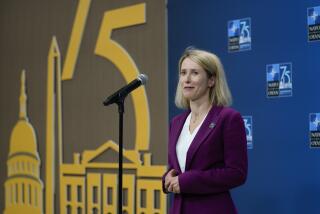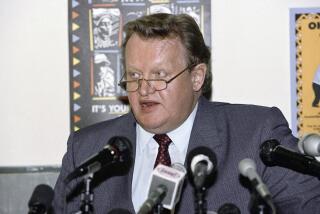Lennart Meri, 76; Estonia’s First President After Break From Soviets
- Share via
TALLINN, Estonia — Former President Lennart Meri, a writer, film director and statesman whose relentless struggle against communist oppression helped Estonia break free from the Soviet Union in 1991, has died, the presidential office said Tuesday. He was 76.
He died overnight at a hospital in Tallinn after a long illness, the office said.
A survivor of a Soviet labor camp in Siberia, Meri became Estonia’s first president after the country regained independence, serving from 1992 to 2001.
“A politician and a visionary has left us,” President Arnold Ruutel, Meri’s successor, said in a statement.
Among ordinary Estonians, Meri was a beloved, charismatic father figure, whose dry humor and razor-sharp wit added to his charm. Government officials, however, were often wary of him because of his scathing attacks on unethical practices and corrupt civil servants.
Internationally, he was a respected statesman who had close ties with several world leaders, including former President Clinton and the late Pope John Paul II.
Meri was widely credited for remaining tough with Russian President Boris Yeltsin in negotiations on the withdrawal of Russian troops from Estonia in 1994.
Born in Tallinn on March 29, 1929, Meri and his family were deported to Siberia after the Soviet invasion of Estonia during World War II -- a fate shared by tens of thousands of people in Estonia and Baltic neighbors Latvia and Lithuania.
The family survived and returned to Estonia, where Meri studied history at the University of Tartu, worked as a theater dramatist and, later, as a producer of radio plays and films.
Among his most well-known films is the 1977 documentary “The Winds of the Milky Way,” describing the lives of Finno-Ugric people, which won a silver medal at the New York Film Festival but was banned in the Soviet Union for its culturally sensitive content.
Meri was one of the leaders of the Baltic country’s independence movement, known as the “singing revolution.” After a brief period as ambassador to Finland, Meri was elected president in October 1992 and was reelected in 1996.
He remained active in politics after stepping down, and attended the pope’s funeral last year.
However, Meri’s health started to deteriorate and in August 2005 he had surgery to remove a brain tumor and was treated at hospitals for long intervals.
Meri is survived by his wife, Helle, three children -- sons Mart and Kristjan and daughter Tuule -- and four grandchildren. Funeral arrangements were not immediately announced.
More to Read
Sign up for Essential California
The most important California stories and recommendations in your inbox every morning.
You may occasionally receive promotional content from the Los Angeles Times.











